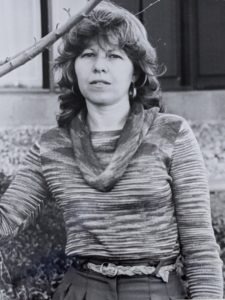I’ve figured out why aging causes me so much trouble. Every sharp curve and pothole along this road is new to me. At forty: what do you mean I can’t see the fine print anymore? Fifty: I’m waking up in a sweat. Cataracts too? Sixty: I can’t stay out late and function the next day.
Seventy: I roll over and straighten my legs cautiously. Cramp. Wait. Slowly slide feet onto the floor and sit up, groaning. This is how I get out of bed now. Seventy-five: I can’t digest spicy food anymore. Well, I can, but the process is long and unamusing. I once worked in the yard half the day. Now an hour finishes me. Who knows what the eighties will bring: I can’t see past that bend in the journey.
I have freaked over every bump on this downhill ride. This ache, that pain: for decades I’ve been rushing to the doctor with alarming developments. Recently, I said, look doc, these puffy wrinkles around my left eye, not the right—it’s a disease isn’t it? She gave me a disinterested but critical glance. “I think it’s how you’re sleeping.”
I stared at her. You mean these are sleep wrinkles, those things you wake up with that disappear by the time you take your shower? The horrible truth dawned: these marks aren’t going away anymore. This was news to me, you see. I’d never experienced such things. I’ve figured it out. It’s because I’ve never gotten old before.
When these concerns start surfacing, doctors should hand you a list: here are the bodily functions that will start breaking down in your forties, your fifties, etc. If you’re a man, not being able to piss at your old geyser rate? Mid-sixties, some sooner, some later. If you’re a woman, involuntary release of urine when you sneeze? In your seventies. I assumed it was bladder cancer. I feel so much better. But how was I to know? I’ve never gotten old before.
Speaking of mortality, there are ways to avoid it. John McPhee, preeminent American essayist, writes about old-person projects, his own and others:
Mark Twain’s old-person project was his autobiography, which he dictated with regularity when he was in his seventies…If ever there was an old-man project, this one was the greatest. It is only seven hundred and thirty-five thousand words long. If Mark Twain had stayed with it, he would be alive today.
This blog is my old-person project, started after I retired. I’ve created a minimum of two pieces of new writing each month, have 240 essays now. I planned to quit after I reached 100. According to McPhee, if I had, I’d be dead now. As it is, I may last for years past our measly U.S. life expectancy of 78.6 so long as I keep writing. An old-person project, McPhee says, is meant to never end. We should all have one.
Everyone wants a long life, but on particular terms: still able to take brisk walks, live independently, keep our wits about us. But let’s be honest: those lists I want of what we’ll lose along the way contain losses to be mourned—muscle tone, smooth skin, snappy reflexes, strength, productive visits to the bathroom. I look at photos of my young self wistfully, with real grief. That girl was so firm of flesh!
In another great essay on getting old, Arthur Krystal said, “The goal, you could say, is to live long enough to think: I’ve lived long enough.” My mother did that, decided she was done and died so quietly while lying on her living room couch that it took a few moments before anyone noticed she wasn’t breathing. In my life I’ve emulated many of her characteristics, willingly and unwillingly, but this is one act I’d truly like to follow: to know when I’ve lived long enough and exit in silence.
After coffee break, I tell Phil that we’ve dawdled long enough and it’s time to get back to work. Phil replies, “we are at the age now that we no longer have to justify our existence. All those aspirations of youth for fortune, fame and artistic achievement are far behind us.”
Sometimes that seems a melancholy sentiment. But most of the time I think that fame and fortune were never worth wanting, or at least they no longer interest me and artistic achievement is a covenant with myself and God. Or to be less grandiose, continuing to write as well as I can is just what I do.
I have been writing today, and although I complained this morning that it had been Monday for a long time already, it’s now evening. Time is tricky, speeds up when you’re not watching. I leave the computer, go to the bathroom and examine that malfunction around my left eye. How I’m sleeping, huh? Add something about this failure of the skin to the seventies decrepitude list.


Hola dear Pat,
You write, “artistic achievement is a covenant with myself and God. Or to be less grandiose, continuing to write as well as I can is just what I do.”
Just to say, amen. And that it’s always a treat to read your blog. And funny, this brought to mind Truman Capote, on the last day of his life, writing his memoir of meeting Willa Cather.
C.M. MAYO http://www.cmmayo.com
Didn’t know that Capote story, C.M. Mayo. Thanks for that.
What a coincidence! I’m getting old for the first time, too.
And one day I will die. That will be my last first.
Gregg. I’m shocked to hear it.
You always speak truth, Pat.
What is the point of writing if not to seek the truth? Thanks, Jana. Also, you were one of those who said, “Why stop at 100?”
Good golly Miss Molly, I’ve encountered a few of these ailments, but you have delivered a brilliant schedule for my upcoming/waning years. I put cataracts and hip replacements on the list, but Kaiser won’t let me make appointments for elective surgery – I will do video appointments until I can’t see, and get down on my knees, push the hips to find those lost pills I occasionally drop. Thanks for the posting.
Most welcome, Mr. Thornton. Did you see Painter’s comment? Turns out he’s old too.
I had bad knees in high school, the caps out of line. Third childbirth flattened my feet, and toddler toting twisted my hips way out of line. Then the running around in my forties from crisis to crisis, thyroid fried and then excavated. These appetizers of old age, with my father’s eye puffs blooming over my cheeks, have given some perspective. Previews and reprieves tell me my mid-fifties are a special occasion I intend to enjoy while I can.
Nice essay, Pat, as always. I adore the project!
Pat — I thought of something I really wanted to say as I read your column, but it slipped my mind. Which leaves me to say only, and once again, what a fine and honest and wry writer you are. Coincidentally I was reading a Whitman poem on turning 71 (which is my age) before moving on to your blog. It was a downer. So your treatment of the subject balanced that out. Sorta. Love, peace and muscle tone to you. — Thaddeus
OMG, yes, I entirely did not cover the mental depredations! That will be a whole other blog.
I have NO idea what you are talking about! On my third cup of coffee and I feel fine!
My son and I painted the house twelve years ago. Should I even think about scraping the peeling stuff to paint it again? What a laugh. I think I’ll just start writing “The Fall of the House of Jaeger.”
Yes, my aging has been eventful for the past 10 years or so—-more and more wrinkles—-I now have an essential tremor in my jaw—–a “pucker” on my retina—-shoulder repair that’s taken 3 years to heal—-melanoma—- arthritis everywhere——and loss of equalibrium when there’s not enough light—-and I can’t remember anybody’s name.
nevertheless, I am happier and more peaceful than I have ever been. amazing how things change, eh?
Winnie
Winnie, what a list! And I didn’t know about any of it. But you sound blissful!
I’ve been spending time with a dear friend, my oldest sister, who just turned 80. She’s struggling with aging but yesterday we went on 3.5 mile hike with an altitude gain of 1500′ (nearly to tree line) and she carried her oxygen tank in a backpack. Amazing and inspiring! She (and my late ma) have been my preview models, so I do know what to expect. I’ve been observing carefully. Recently I decided to consider this physical vessel dispassionately, like a biology experiment in a petrie dish. Nothing is changing much to the me inside, (well, maybe a little memory loss and if I can’t remember it, it’s gone anyway) but it is interesting to watch the manifestations of time slapping my body around. It’s still me in here, looking out and watching.
Well-realized observation, Deb. I also have the me inside unchanged, the body a whole ‘other thing experience.